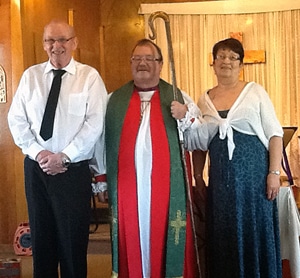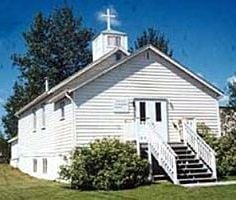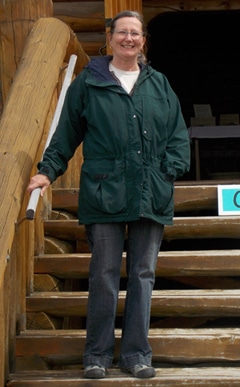In August of 2012, Terry and Ida Reid loaded a year’s worth of belongings onto their half-ton truck and left Newville, in Central Newfoundland, to head west and north. “We were leaving our friends and family, our house–and definitely our comfort zone. We felt it was a calling–and we responded.”

The Reids were responding to an invitation—which Ida had seen online–from Bishop Larry Robertson of the Diocese of Yukon to come and be “Ministers of Presence”—to commit to a year of living in and providing basic pastoral care to a northern community.
“I’d had a fair bit of experience in the North, in my teaching career [in Labrador] and working in camps; my husband had just retired from teaching. We had a pension and so we said ‘Yes, we’ll come,’ and we did. I can’t say it was a hard decision.”
Awaiting them in Fort Nelson, BC was a furnished rectory, a monthly honorarium, and a friendly, receptive congregation—one of numerous Yukon parishes that Bishop Robertson describes as having been “in need of pastoral care” with “no one to provide it.”
Robertson explains: “At its peak, about 15 – 20 years ago, the Diocese of Yukon had 15 stipendiary clergy.…The mines were thriving and they required their employees to live on site.”
But the situation Robertson inherited when he took office in 2010 was a radically different one. “The mines had closed and the employees either moved or, in the case of many, became unemployed.” In the past, in many cases the mines “saw the value of the Church and directly assisted them with supplying buildings and labour.” But today, “as new mines open up, they do not require their employees to live on site but fly them in and out again at the end of their shifts. There is little contact with the local community.”
The other change afoot—one much bigger than the Diocese of Yukon’s local struggles—was the declining financial state of the Anglican Church of Canada, which had been supporting the Diocese of Yukon through the Council of the North.
The diocese, faced with reduced parish incomes and shrinking national budgets and grants, was unable to replace retiring and relocating ministers. Added to this bleak scenario were the ongoing effects of the residential school system.
According to Robertson, “Some parishes shut down. Others continued to function with a small number of dedicated lay ministers.”

But Robertson, painfully aware of the financial struggles of the national Church, was also considering its hidden wealth: its vast numbers of talented, compassionate and financially secure members, both lay and ordained–people with energy, skill and time on their hands. He says, “This is an opportunity and there are an awful lot of people who come to the end of their career and say ‘I’m not ready, I still have much to give to God.’…The reality is, especially in our cities, there are many trained people, who are retired but are not ready to roll over. And it gives them an opportunity to minister in a different atmosphere, to a different culture.”
Robertson looked at what his diocese could offer: “We’ve had all these empty rectories, they’ve been rented out. We’ve seen this and we’ve asked for volunteers—primarily from the South. They need to have their own income.” The diocese offers a small supplemental honorarium, as well as housing and ministry costs; volunteers are expected to have their own vehicles. But because the position is a volunteer one, the usual expectations of clergy are more relaxed. Robertson says, “They fit themselves. We ask that they look after the Sunday service, then they fit their ministry with the needs of the parishes and their own skills.”
The Reids, with both musical talent and training in education, were responsive to their congregation’s needs. Ida says, “Fort Nelson needs a lot of healing; things that happened in the past caused people to get away from the Church’s life.” After their arrival, Reid says, “It took awhile to feel our way around, then I realized this church certainly needed uplifting. So we went to work to bring in some resource people to do weekends of training for spiritual uplifting. Well, then we had kids who needed to be confirmed; we’re still trying to get a Sunday School off the ground. And I’m working to get a little choir organized. It’s coming.”

Lynn De Brabandere, who, with her husband, owns a small family farm north of London, ON, serves under the same model in Haines Junction, Yukon. With skills in spiritual direction, community building and organizing, De Brabandere has initiated community meals in Haines Junction, a summer art gallery in the church hall and also leads retreats for diocesan women.
But for all the “Ministers of Presence” in the Yukon, the main work is simply to be present to the community.
De Brabandere says “When people ask what I do each day, I guess the need is whatever comes my way…when I answer the phone or someone comes to the door, I’m present to that need. ‘Minister of Presence’—it’s a name that in itself is beautiful. If you ask your children or friends, it’s great when someone is truly present to you.”
Ida Reid comments on what is both a humble and a profound calling: “Quite often people just want to sit and talk and have a listening ear…You know, the title itself says a lot: you’re representing God here on earth.” Reid does not hesitate to recommend this opportunity to “anyone who might feel they have that calling.”
While De Brabandere, the Reids and Ford Hewlett, a new minister in Watson Lake, Yukon, are the ones officially working under the Ministry of Presence paradigm, their bishop is modeling it too. De Brabandere says, “The bishop says ‘Anything you need, you call.’… He embraces everyone’s experiences; he’s a very good listener, which then allows us to be the same. It’s more about being than doing.”
This diocesan support is immensely helpful to De Brabandere in terms of the isolation she might otherwise feel, especially as she and her husband, who is now semi-retired from their farm and travels back and forth between Ontario and the Yukon, are apart for several months of the year. However, she also reflects on some of the personal benefits of a northern lifestyle: “At my stage in life, it’s very nice to have a more simple lifestyle. It’s a quiet life: people love the outdoors, to cross country ski…you feel very connected with nature.”
As for the ministry of presence, she says, “I’d like to say it’s 9 to 5, 5 days a week, but it’s more like being a parent, there are no vacations. It’s something that you take with you…it’s that sort of love that we’re called to.”
Interested in keeping up-to-date on news, opinion, events and resources from the Anglican Church of Canada? Sign up for our email alerts .
